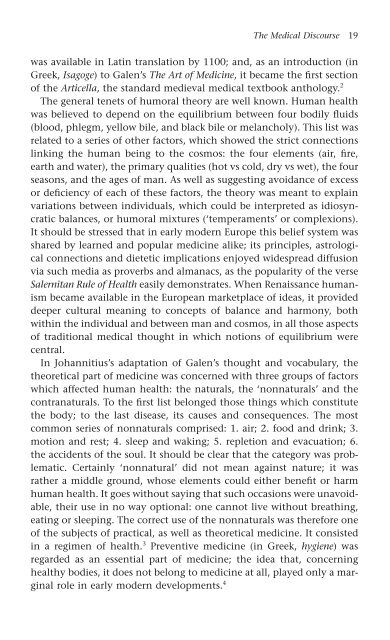Recreation in the Renaissance
Recreation in the Renaissance
Recreation in the Renaissance
- No tags were found...
Create successful ePaper yourself
Turn your PDF publications into a flip-book with our unique Google optimized e-Paper software.
The Medical Discourse 19<br />
was available <strong>in</strong> Lat<strong>in</strong> translation by 1100; and, as an <strong>in</strong>troduction (<strong>in</strong><br />
Greek, Isagoge) to Galen’s The Art of Medic<strong>in</strong>e, it became <strong>the</strong> first section<br />
of <strong>the</strong> Articella, <strong>the</strong> standard medieval medical textbook anthology. 2<br />
The general tenets of humoral <strong>the</strong>ory are well known. Human health<br />
was believed to depend on <strong>the</strong> equilibrium between four bodily fluids<br />
(blood, phlegm, yellow bile, and black bile or melancholy). This list was<br />
related to a series of o<strong>the</strong>r factors, which showed <strong>the</strong> strict connections<br />
l<strong>in</strong>k<strong>in</strong>g <strong>the</strong> human be<strong>in</strong>g to <strong>the</strong> cosmos: <strong>the</strong> four elements (air, fire,<br />
earth and water), <strong>the</strong> primary qualities (hot vs cold, dry vs wet), <strong>the</strong> four<br />
seasons, and <strong>the</strong> ages of man. As well as suggest<strong>in</strong>g avoidance of excess<br />
or deficiency of each of <strong>the</strong>se factors, <strong>the</strong> <strong>the</strong>ory was meant to expla<strong>in</strong><br />
variations between <strong>in</strong>dividuals, which could be <strong>in</strong>terpreted as idiosyncratic<br />
balances, or humoral mixtures (‘temperaments’ or complexions).<br />
It should be stressed that <strong>in</strong> early modern Europe this belief system was<br />
shared by learned and popular medic<strong>in</strong>e alike; its pr<strong>in</strong>ciples, astrological<br />
connections and dietetic implications enjoyed widespread diffusion<br />
via such media as proverbs and almanacs, as <strong>the</strong> popularity of <strong>the</strong> verse<br />
Salernitan Rule of Health easily demonstrates. When <strong>Renaissance</strong> humanism<br />
became available <strong>in</strong> <strong>the</strong> European marketplace of ideas, it provided<br />
deeper cultural mean<strong>in</strong>g to concepts of balance and harmony, both<br />
with<strong>in</strong> <strong>the</strong> <strong>in</strong>dividual and between man and cosmos, <strong>in</strong> all those aspects<br />
of traditional medical thought <strong>in</strong> which notions of equilibrium were<br />
central.<br />
In Johannitius’s adaptation of Galen’s thought and vocabulary, <strong>the</strong><br />
<strong>the</strong>oretical part of medic<strong>in</strong>e was concerned with three groups of factors<br />
which affected human health: <strong>the</strong> naturals, <strong>the</strong> ‘nonnaturals’ and <strong>the</strong><br />
contranaturals. To <strong>the</strong> first list belonged those th<strong>in</strong>gs which constitute<br />
<strong>the</strong> body; to <strong>the</strong> last disease, its causes and consequences. The most<br />
common series of nonnaturals comprised: 1. air; 2. food and dr<strong>in</strong>k; 3.<br />
motion and rest; 4. sleep and wak<strong>in</strong>g; 5. repletion and evacuation; 6.<br />
<strong>the</strong> accidents of <strong>the</strong> soul. It should be clear that <strong>the</strong> category was problematic.<br />
Certa<strong>in</strong>ly ‘nonnatural’ did not mean aga<strong>in</strong>st nature; it was<br />
ra<strong>the</strong>r a middle ground, whose elements could ei<strong>the</strong>r benefit or harm<br />
human health. It goes without say<strong>in</strong>g that such occasions were unavoidable,<br />
<strong>the</strong>ir use <strong>in</strong> no way optional: one cannot live without breath<strong>in</strong>g,<br />
eat<strong>in</strong>g or sleep<strong>in</strong>g. The correct use of <strong>the</strong> nonnaturals was <strong>the</strong>refore one<br />
of <strong>the</strong> subjects of practical, as well as <strong>the</strong>oretical medic<strong>in</strong>e. It consisted<br />
<strong>in</strong> a regimen of health. 3 Preventive medic<strong>in</strong>e (<strong>in</strong> Greek, hygiene) was<br />
regarded as an essential part of medic<strong>in</strong>e; <strong>the</strong> idea that, concern<strong>in</strong>g<br />
healthy bodies, it does not belong to medic<strong>in</strong>e at all, played only a marg<strong>in</strong>al<br />
role <strong>in</strong> early modern developments. 4










